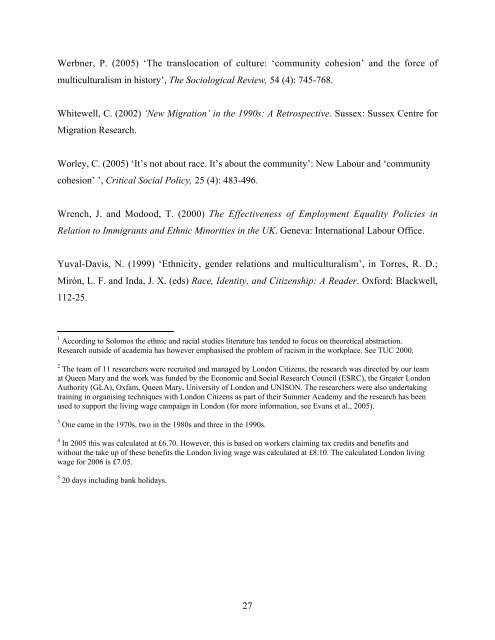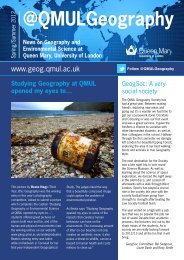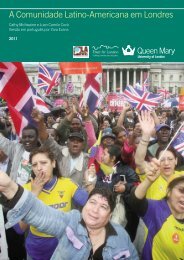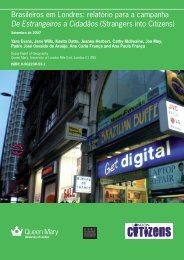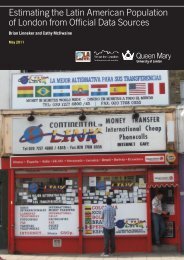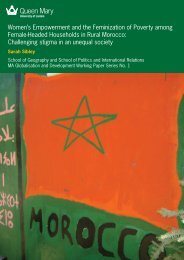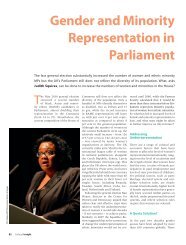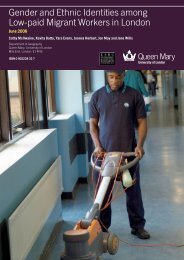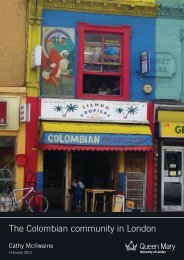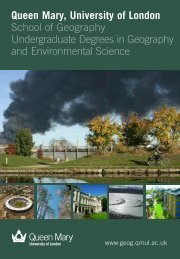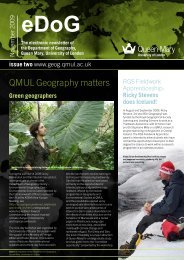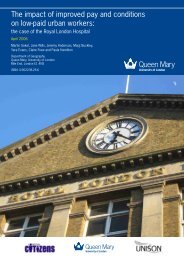Multiculturalism at work: The experiences of Ghanaians in London
Multiculturalism at work: The experiences of Ghanaians in London
Multiculturalism at work: The experiences of Ghanaians in London
- No tags were found...
You also want an ePaper? Increase the reach of your titles
YUMPU automatically turns print PDFs into web optimized ePapers that Google loves.
Werbner, P. (2005) ‘<strong>The</strong> transloc<strong>at</strong>ion <strong>of</strong> culture: ‘community cohesion’ and the force <strong>of</strong>multiculturalism <strong>in</strong> history’, <strong>The</strong> Sociological Review, 54 (4): 745-768.Whitewell, C. (2002) ‘New Migr<strong>at</strong>ion’ <strong>in</strong> the 1990s: A Retrospective. Sussex: Sussex Centre forMigr<strong>at</strong>ion Research.Worley, C. (2005) ‘It’s not about race. It’s about the community’: New Labour and ‘communitycohesion’ ’, Critical Social Policy, 25 (4): 483-496.Wrench, J. and Modood, T. (2000) <strong>The</strong> Effectiveness <strong>of</strong> Employment Equality Policies <strong>in</strong>Rel<strong>at</strong>ion to Immigrants and Ethnic M<strong>in</strong>orities <strong>in</strong> the UK. Geneva: Intern<strong>at</strong>ional Labour Office.Yuval-Davis, N. (1999) ‘Ethnicity, gender rel<strong>at</strong>ions and multiculturalism’, <strong>in</strong> Torres, R. D.;Mirón, L. F. and Inda, J. X. (eds) Race, Identity, and Citizenship: A Reader. Oxford: Blackwell,112-25.1 Accord<strong>in</strong>g to Solomos the ethnic and racial studies liter<strong>at</strong>ure has tended to focus on theoretical abstraction.Research outside <strong>of</strong> academia has however emphasised the problem <strong>of</strong> racism <strong>in</strong> the <strong>work</strong>place. See TUC 2000.2 <strong>The</strong> team <strong>of</strong> 11 researchers were recruited and managed by <strong>London</strong> Citizens, the research was directed by our team<strong>at</strong> Queen Mary and the <strong>work</strong> was funded by the Economic and Social Research Council (ESRC), the Gre<strong>at</strong>er <strong>London</strong>Authority (GLA), Oxfam, Queen Mary, University <strong>of</strong> <strong>London</strong> and UNISON. <strong>The</strong> researchers were also undertak<strong>in</strong>gtra<strong>in</strong><strong>in</strong>g <strong>in</strong> organis<strong>in</strong>g techniques with <strong>London</strong> Citizens as part <strong>of</strong> their Summer Academy and the research has beenused to support the liv<strong>in</strong>g wage campaign <strong>in</strong> <strong>London</strong> (for more <strong>in</strong>form<strong>at</strong>ion, see Evans et al., 2005).3 One came <strong>in</strong> the 1970s, two <strong>in</strong> the 1980s and three <strong>in</strong> the 1990s.4 In 2005 this was calcul<strong>at</strong>ed <strong>at</strong> £6.70. However, this is based on <strong>work</strong>ers claim<strong>in</strong>g tax credits and benefits andwithout the take up <strong>of</strong> these benefits the <strong>London</strong> liv<strong>in</strong>g wage was calcul<strong>at</strong>ed <strong>at</strong> £8.10. <strong>The</strong> calcul<strong>at</strong>ed <strong>London</strong> liv<strong>in</strong>gwage for 2006 is £7.05.5 20 days <strong>in</strong>clud<strong>in</strong>g bank holidays.27


